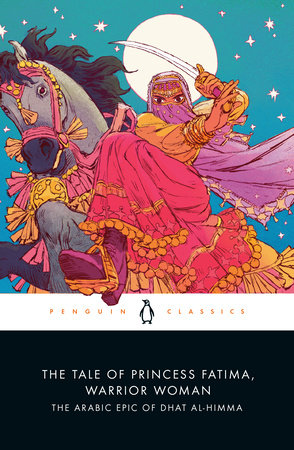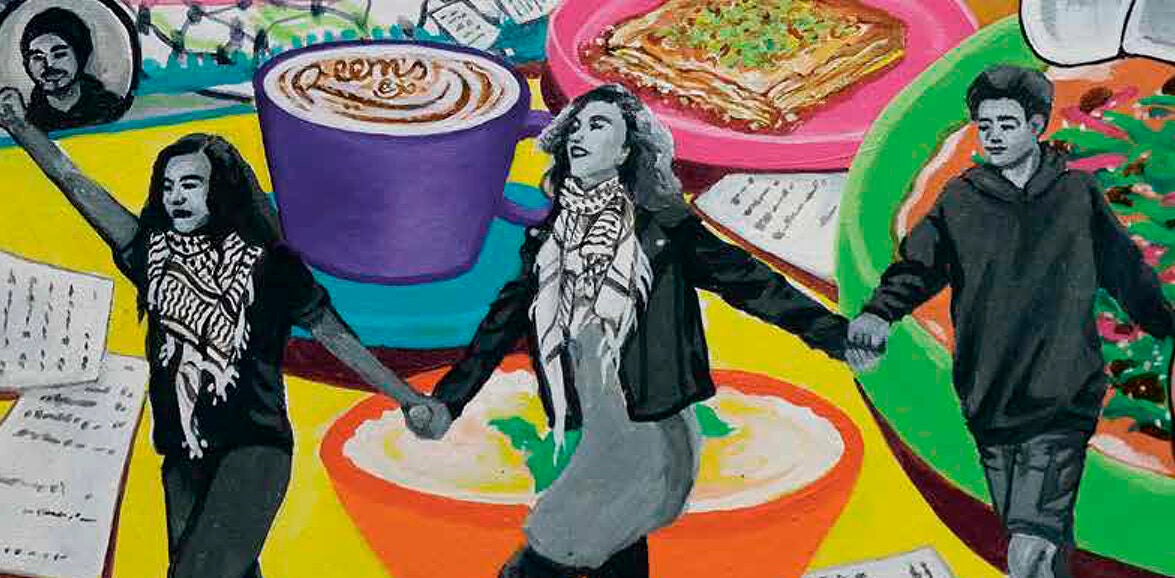Ancestors: The Opening Episode of the Epic
Al-Harith (Fatima's great-great-grandfather) was a legendary leader of the Bani Kilab tribe. He led a brave life of hunting in the rugged Yemeni deserts, steppes, and river valleys in the days of the seventh-century caliph Abd al-Malik bin Marwan. One day, in the process of capturing some ferocious men and looting a camp, he saw a girl named Al-Rabab, and he fell in love. The girl's father, emotionally attached to her, cried when Al-Harith approached. Al-Harith asked the father, "Why are you crying, Shaykh?"
"I'm crying because you're taking my daughter by force. If you didn't take her against her will, then I would not cry. If you really want her, then marry her properly. It's to your advantage, ultimately, to follow the prophet's example."
Al-Harith readily released the elderly man, his daughter, and all their people, giving the man one thousand she-camels and a hundred gold dinars as dowry. After ensuring that the marriage was legitimate and respectable, Al-Harith and Al-Rabab moved on into the wilderness.
It was not long before Al-Rabab became pregnant. One night near the end of her pregnancy, she saw in her dreams that she was in a desert, surrounded by plains. As she neared a tall hill, her hem lifted and fire came out from beneath it in incandescent colors. When it reached the ground, it burned everything both near and far. She whirled around, and she too was engulfed in flames.
Al-Rabab started in her sleep in sheer terror. Al-Harith asked, "What's wrong, dear?"
"I saw something terrible and had such a fright," and she told him her dream from start to finish.
"Tomorrow I'll get a diviner. I'll bring you someone knowledgeable. You can tell him the dream and see what he says."
At daybreak, Al-Harith rode to the scholar's camp. There he exchanged greetings and introduced himself, and the men of the camp invited him to sit with them before asking what he needed. He explained, "Gentlemen, I come to you in need. I have seen you defer to this shaykh, and I understand that he is incredibly wise." Then Al-Harith sat closer to the shaykh, greeted him, and recounted his wife's vision.
The shaykh replied, "I see that yours is a special situation, and so the interpretation will also be uncommon. For if I am correct, based upon my knowledge of the holy books of all the great peoples, this woman will give birth to an extraordinary child, unmatched in his time for greatness, ethics, and good looks. Yet I fear that the mother will die when he appears safely in this world."
Al-Harith found the news generally positive. "The important thing is that he will live. His mother and I have seen much, and death comes for rich and poor alike."
Al-Harith returned to his camp with the shaykh and took him to meet his wife. He told her what the shaykh had said and asked her to recount her dream. Turning to the shaykh, she spoke in verse:
O Shaykh, by the Sacred Family,
By Mina, Zamzam, and the Maqam of Abraham,
I had an astonishing dream
Hear my words, and interpret my vision
I saw that I was in a great desert,
Spacious prairies surrounding me.
Beneath me was a tall sand dune,
My hem lifted, and my tears fell,
And from within me there came a fire
It flared and burned
In many colors, including black
It spread, burning the tent,
Burning the tribes and campsites
It turned, lighting up the darkness, and
I was terrified and afraid:
That is what happened to me in the dream.
The shaykh replied in kind:
I tell you the meaning of the dream,
And what you saw in the dark,
Your child nears, full of fury,
He will be long remembered.
He will arise, a brave and heroic warrior,
Stirring up enemies among every people
He will be raised an orphan, lacking both father and
Mother, and he will travel far and wide
From him there will come a valiant leader
Opposing enemies with the sword
This is the sign I have from my studies
In interpretation of your dream.
Then he recorded the dream and the baby's genealogy, put it in a tiny silver case, and gave it to Al-Rabab as an amulet for the baby.
Within days, Al-Harith fell ill and died. The leader's death, in a time of instability, caused chaos. No longer held back by fear and respect for Al-Harith, nearby tribes sought to claim all that was his. For Al-Rabab, the unrest followed a time of peace made possible by her husband's bravery. She cried hard for the memory of him and composed poetry mourning her loss. In grave danger, she decided to escape with the remaining servant, the others having already fled. Unfortunately, he had remained out of desire for her, which would prove her demise. When Al-Rabab asked the servant for help, he asked what he could do for her.
"Travel with me by night, so that no horses will come across us, and deliver me to my people or to any of the Arab encampments that will offer us sanctuary. We'll go in plain clothes because I fear that someone might take advantage of me. You know how much your master Al-Harith used to assert himself over the Arabs. I have become a prize. . . . Some hostile leader might demand from me that which men want from women, but I swear by the Victorious, the Almighty Sovereign, I will not give in to any man, good or bad."
"My Lady, I am at your service." They rode away at night as refugees, leaving most of the wealth behind. When he swerved away from the path, she followed unknowingly. They had been nearing a camp led by a man named Darim, but the servant saw her beauty and could not resist an attempt to seduce her. Al-Rabab resisted with insults and exhorted him to protect her honor and her person, but he claimed that he had waited long enough. She screamed at him that she had declined the offers of great leaders, so how could she give in to a servant? At the height of their argument, the servant knocked Al-Rabab to the ground, and she began bleeding. The servant backed away and asked, "What is this blood?"
Al-Rabab answered, "Didn't you know that I was pregnant with Al-Harith's child? You pushed me so hard that I've gone into labor." He dragged her to the river to wash, then moved away to think. Al-Rabab sat by the river crying, shaking from the contractions, wishing she could die instead of enduring the pains of labor. A little while later, Al-Rabab gave birth to a boy, like a piece of the moon. She cut the umbilical cord, wrapped him in a piece of her sash and her scarf, and put the silver amulet on him. Then she took him into her lap, and as he began nursing, his eyes opened. Looking down at him, she whispered, "Where is your father? If only he could gaze on you. . . . But this must be God's will for us. . . ."
The servant, overtaken by frustration after so nearly attaining his desire, blamed Al-Rabab for the timing of the birth. Despite her protestations that the timing was out of her hands, he struck her with a sword, and she slumped to the ground, dead. The servant took what money she had and left her on the sand before escaping to a mountainous area. Al-Rabab lay on her side, the infant in her lap, still latched to her breast.
A man named Darim ruled the valley where Al-Rabab lay. His wife had recently given birth to a son who did not survive. In order to distract him from his grief, he took his people's advice and went out hunting with some of his kinsmen. When a herd of wild animals saw the approaching hunting party, they dispersed and fled. In the chase, Darim was led by fate to the place where he discovered a baby still suckling from the fallen corpse of his mother. Despite the heat, the baby was healthy, and beautiful "like the moon." God had sent a cloud of jundaba locusts to shade him. Darim turned to one of his companions, saying, "Cousin, look at this murdered girl, the baby at her side, and the cloud of locusts giving him shade. See how the mother is nursing him even though she is dead. Tell me at once: What do you make of this?"
The man, who was Darim's adviser and right hand, deduced a story from the scene: "Sir, such mysteries only God can know fully. If only I had known of her, I could have saved her from this. However, I'll tell you what I imagine happened. This girl was born to a noble family. A ruler asked to marry her, but a servant caught her eye, and she ended up losing her virginity. When her family learned of the relationship, they brought her to this place and killed her when she gave birth. They left the baby at her side and left her as she lays now. That's what occurs to me."
"How dare you insult her! If she had fornicated, she wouldn't be nursing him while dead, and God would not have sent the swarm to shade him." Turning to the corpse, he mused in verse,
I wonder who killed you,
Who felled you with his sword?
Were you an innocent victim,
Or were you by fate served?
You are clearly a noblewoman
And I think virtuous, because of the milk poured . . .
May the little one have a bright future,
Blessed by the Lord.
"I'm sure you're right, Sir. Your son just passed away, and this boy is clearly precious. You should take care of him."
Darim sent a messenger, calling for women skilled in preparing a corpse for burial and for men to dig a grave. He oversaw the funeral, praying over her, and removed his outer garments in order to descend into the grave to lay the body carefully in the ground before covering it with dirt. Then he returned home, the baby in his arms.
His wife, Husna, met him at the door, inquiring about why he had needed a corpse washer and what he had found during the hunt. He told her what had happened from start to finish, saying, "I went hunting for a wild animal, but instead I bring you a wonder. . . . It's a boy!" He handed her the baby, and the amulet that he had worn. "Take this amulet, and put it over his head. I feel as if this is the baby we lost. Let's raise him, and may he bring us blessings." Husna put the amulet over the baby's head and kept the child.
An old woman accused the baby of illegitimate birth. So Husna asked her husband about the child's parentage when he returned from a meeting and expressed her concern for their reputation. Darim replied, "Cousin, don't worry about that. People say all kinds of crazy things. This child's mother was the daughter of a great amir. If she had been dishonorable, then the Compassionate would not have indicated her innocence by allowing her dead body to continue nursing her infant. Nor would there have been a swarm of locusts shading the babe. Look, I'll give you ten gold dinars every month, and you feed the baby and take care of him. The Compassionate won't disappoint us if we are patient and do what is right."
"All right, what shall we name him?" Husna asked.
"Jundaba, because I found jundaba locusts at his head."
Husna took Jundaba in her lap and nursed him until he was full, and she and Darim came to love their new son.
Jundaba's Childhood and First Adventure
At seven, Jundaba attended Quranic school. As he grew up, he rode horses and learned the arts of combat. Through regularly challenging local champions and learning from them, Jundaba gradually developed into a capable rider and a ferocious warrior.
One day, as Darim was riding with his companions, he stumbled upon the land of a woman named Al-Shamta. Not knowing that she was a fierce warrior in her own right, he began to drive her livestock away, as was the custom among rivals. After all, he was accompanied by one hundred warriors. Then he heard a horn blown to alert Al-Shamta of a threat. Al-Shamta mounted her horse and rode to attack him and his companions. She felled many of them before making for him as quickly as water bursting out of the narrowness of a pipe. Realizing his mistake, he attempted to fight her, but she blocked his blows and overcame him, knocking him off his horse. She jumped down from her mount and tied him with his own turban, before slapping his horse on the rump, sending it away. His remaining servants fled from her and returned to his camp, calling out the terrible news of Darim's capture. One of Darim's servants returned with his master's horse, confirming the news.
By this time, Darim and Husna had ten strapping sons in addition to Jundaba, who was away herding animals in the mountains. The sons were knowledgeable about warfare and combat, so the people of Darim's camp appealed to them to rescue their father. They set out on horseback to avenge him, fully armored and carrying spears. When they arrived within sight of Al-Shamta's fortress, and she realized that they were Darim's sons, Al-Shamta rose to meet them like a hungry lioness. She put on her battle dress and went out like a mother protecting her cub. Carrying her spear and moving like a tiger, she entered the square outside and stood in its center. She addressed the young men: "Sons of Lord Darim, I have come out to you, so finish me off here in this square or be exterminated."
The eldest, like a great lion, approached her and spoke in rhyme,
Al-Shamta, I am here to ransom my father.
If you bring him out, I'll be no bother.
She replied in kind,
You've sealed your fate. I am Al-Shamta, whom even lions fear.
For you, it is now too late.
She attacked him, baring her teeth. Then she parried, evading him, and said, "May God give me victory over you all!"
Hearing the plural in her words, the eldest son assumed that his brothers had joined behind him to help him attack her. She distracted him, and while he was caught off guard, she grabbed the end of his turban and used the cloth to tie him up. When his brothers saw this, they all wanted to attack her, but forty warriors had joined her in an instant. They could not possibly win a battle at these odds, so the second eldest took his turn in single combat with Al-Shamta. Their exchange did not last long before she had bested him, and then she set to beating each of his brothers in turn.
Copyright © 2021 by Melanie Magidow. All rights reserved. No part of this excerpt may be reproduced or reprinted without permission in writing from the publisher.








